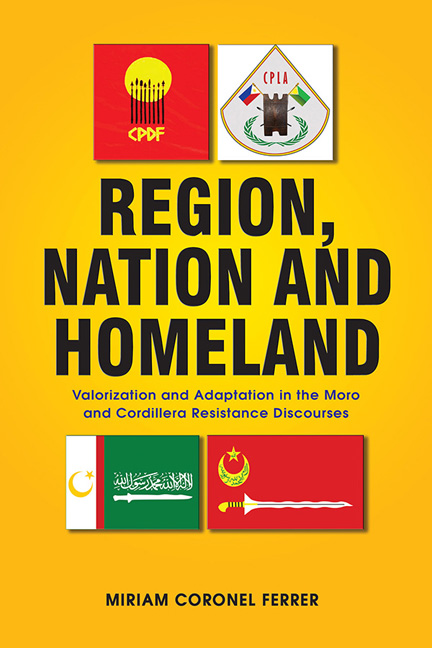 Region, Nation and Homeland
Region, Nation and Homeland Book contents
- Frontmatter
- Contents
- Preface
- List of Abbreviations
- Maps
- 1 Introduction: Text and Resistance
- 2 The Moro Liberation Movement: From Secession to Autonomy
- 3 The Cordillera Movement (1970s–2008): Building and Losing the Consensus
- 4 Nation, Homeland and Ancestral Domain: Intertextuality in the Moro Discourse
- 5 Identity Ambivalence in the Pan-Cordillera Discourse
- 6 Conclusion
- Bibliography
- Index
- About the Author
- Frontmatter
- Contents
- Preface
- List of Abbreviations
- Maps
- 1 Introduction: Text and Resistance
- 2 The Moro Liberation Movement: From Secession to Autonomy
- 3 The Cordillera Movement (1970s–2008): Building and Losing the Consensus
- 4 Nation, Homeland and Ancestral Domain: Intertextuality in the Moro Discourse
- 5 Identity Ambivalence in the Pan-Cordillera Discourse
- 6 Conclusion
- Bibliography
- Index
- About the Author
Summary
In this book we have examined the respective discourses of two armed ethnopolitical mobilizations in the south and north of the Philippines; namely, the Moro and Cordillera movements. We traced how some core elements of these articulations have become valorized and accepted as gospel truths by their respective politicized masses of adherents. At the same time, we saw how the movement organizations modified their framings and appropriated elements from global and other domestic discourses, showing how creatively and pragmatically movement intellectuals adapted to new ideas and the changed conditions over the forty-year period since their movements emerged.
We followed the MNLF intellectuals in founding their claim to a separate/autonomous Bangsa Moro and statehood. The MILF enriched this core Moro ethnonationalist discursive practice by further highlighting Islam as an organizational and ideological platform, effectively distinguishing itself from its more secular mother organization, the MNLF. In the 1990s the MILF complemented their two-axis discourse on nation and Islam with a third axis that maximized the language of ancestral domain and IP rights.
Meanwhile, we saw how the Cordillera struggle for regional autonomy emerged in the mid-1970s from the popular opposition to several development programmes instituted by the Marcos regime. The popular opposition was harvested and later led by the CPP operating in the region. The CPP-led CPDF, which became the underground organizational expression of the movement, espoused a Marxist ideology and dovetailed the popular opposition to support the national democratic revolution whose class-based struggle tended to subordinate ethnonationalist aspirations. The CPLA that split from the CPP was dominated by cadres who were natives of the Cordillera provinces. These leading cadres espoused a more decisively ethnonationalist platform that stressed the oppression of the Cordillera cultural communities by the Filipino majority. In this aspect, their discourse veered more closely to that of the Moro ethnonationalists. In the same vein, they elevated the notion of a Cordillera (administrative and political) region to a ‘nation’ and had irredentist claims to wider territories and ethnic groupings. They also favoured a federal state that drew features from their cultural practices and institutions such as the bodong (peace pact), as against a regional autonomy movement that was subordinated to the larger national democratic agenda of the CPP-CPDF.
- Type
- Chapter
- Information
- Region, Nation and HomelandValorization and Adaptation in the Moro and Cordillera Resistance Discourses, pp. 199 - 210Publisher: ISEAS–Yusof Ishak InstitutePrint publication year: 2020


